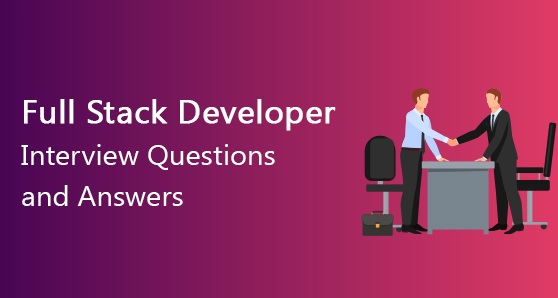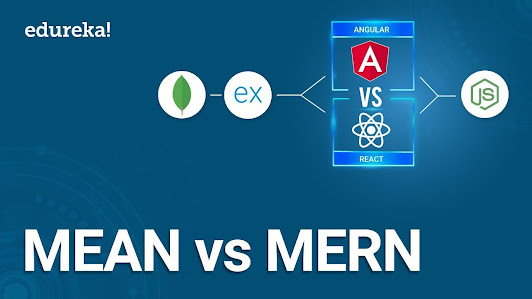Top MERN Stack Interview Questions
MERN
stack stands for MongoDB, Express, React and Node.js. MERN stack is one of the
most popular framework for developing web and mobile applications. It provides
database back-end while react is the client-side front-end web framework,
express and node are middleware in MERN stack. The MERN stack enables fast
development of applications that are easy to debug specially using JSON
documents. In case you are considering MERN stack bootcamp to
train for a progressing career then here are top MERN stack interview questions
to consider and test your skill and knowledge on the MERN stack for cracking
the technical interview with ease!
Q.1How
does React work?
It
creates a virtual DOM. When the condition changes in a component it initially
runs a “diffing” algorithm, which identifies what has changed in the virtual
DOM. The second step is reconciliation, where it updates the DOM with results
of diff.
Q.2What
is props in React?
Props
are inputs to a React component. They are single values or objects containing a
set of values which are passed to React components on creation using a naming
convention similar to HTML-tag attributes. This implies they are data passed
down from a parent component to a child component. The primary purpose of props
in React is to providing component functionality- Pass custom data to React
component.
Q.3What
Is Replication In MongoDB?
Replication
is the system of synchronized data across numerous services and offers
redundancy and increased data availability. With several copies of data on
different database servers, replication protects a database from loss of single
server. It allows one to recover from hardware failure and service
interruptions. MERN stack coding bootcamp can be helpful to
learn several techniques and tools to ace in a fast-paced career.
Q.4What
are Higher-Order components?
Higher-order
component is a function that takes a component and returns a new component.
Generally, it is a pattern that is derived from React compositional nature and
one could call them as ‘pure’ components because one can accept any dynamically
offer child component but they would not modify or copy any behaviour from
input components.
Q.5
What do you mean by Asynchronous API?
All
APIs of Node.js library are asynchronous that is non-blocking. It essentially
means a Node.js depends on server never waits for a PI to return data. Server
moves to next API after calling it and a notification mechanism of Events of
Node.js assists in server to get response from previous API call. Coding Bootcamp is one of the way forward to gain insight into
the fastest paced career.
Q.6 What
is Callback Hell ?
The
asynchronous function requires callbacks as a return parameter. When several
asynchronous functions are chained together then callback hell situation turns
up.
Q.7 What
is Reconciliation?
When
a component’s state change, React decides whether an actual DOM update is
important, by comparing the newly returned element with earlier rendered one.
When they are not equal, React would update the DOM. This process is known as
reconciliation.
Q.8 Does
MongoDB Support Foreign Key Constraints?
No.
MongoDB does not support relationships. Database does not apply any constraints
to the system, so there are no “cascading deletes or updates”. Generally, in a
NoSQL database it is up to you to decide how to organise the data and its
relations if there are any.
Q.9
How Node prevents blocking code?
By
offering callback function. Callback function gets called when equivalent
events are generated.
Q.10
How can you achieve transaction and locking in MongoDB?
For
achieving concepts of transaction and locking in MongoDB, one can use the
nesting of documents, also known as embedded or sub documents. MongoDB offers
atomic operations within a single document.
Q.11 How
does Node.js handle child threads?
Node.js
in its real nature is a single thread process and does not represent child
threads and thread management methods to the developer. Technically, Node.js
does spawn child thread for certain tasks such as asynchronous I/O, but run
behind the scenes and do not run any application JavaScript code, nor block
main event loop. If threading support is needed in Node.js applications, there
are tools available to enable it, such as ChildProcess module.
Q.12
How to avoid Callback Hell in Node.js?
Node.js
internally make use of a single-threaded event loop for processing queued
events. This approach could lead to blocking entire process if in case task
running for a longer stretch than expected. Node.js addresses this issue by
incorporating callbacks known as higher order functions. So whenever a long
running process ends its execution, it aims the callback associated. Often it
could lead to complex and unreadable code, higher the numbers of callbacks,
longer chain of returning callbacks would be. There are four remedies that can
address the callback hell issue- Use async or await mechanism, use promises
mechanism, use generators or make use of program modular. If you wish to know
more about the same opt for MERN stack bootcamp.
Q.13
If Node.js is single threaded then how it handles concurrency?
Node
provides a single thread to programmers so that code can be written easily and
without bottleneck. Node internally uses multiple POSIX threads for various I/O
operations such as File, DNS, Network calls etc. When Node gets I/O request it
creates or uses a thread to perform that I/O operation and once the operation
is done, it pushes the result to the event queue. On each such event, event
loop runs and checks the queue and if the execution stack of Node is empty then
it adds the queue result to execution stack.
Q.14
What are Pure Components?
Pure
component is similar to Component but it can handle the should component update
method for you. When props or state changes, PureComponent can do a shallow
comparison on both props and state. Component, on one hand, won’t compare
current props and state to next out of the box. Therefore, the component can
further provide by default whenever shouldComponentUpdate is called.
Q.15 What
are React Hooks?
Hooks are among the latest addition in React 16.8. They let us make use of state and other React features without writing a class. With hooks, one can extract stateful logic from a component so it can be tested independently and reused. Hooks allow one to reuse stateful logic without changing one component hierarchy. This makes it easy to share hooks among numerous components o with the community. So, in a nutshell, coding bootcamp are essentially the place to be at to be equipped with the latest technologies.
Also, Read This Blog: A complete guide to learning MERN Stack




Comments
Post a Comment